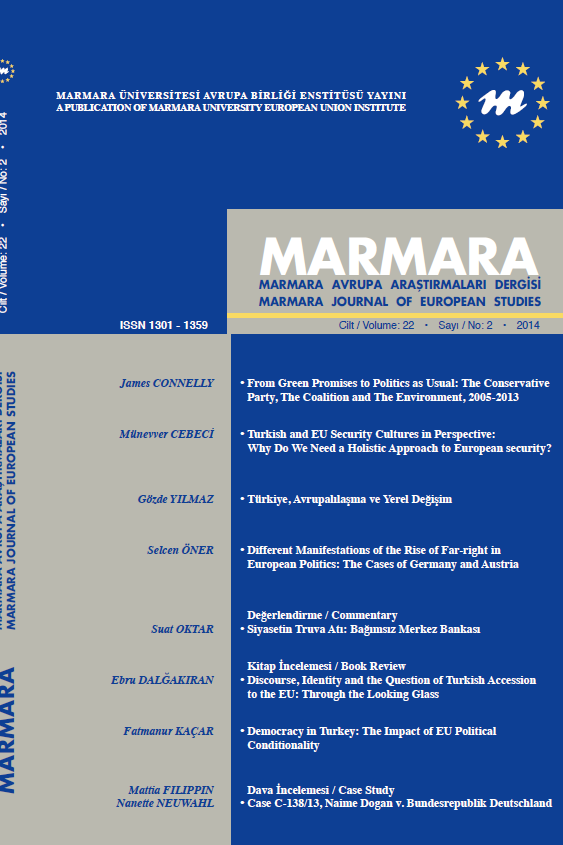AVRUPA BİRLİĞİ’NİN SERBEST TİCARET ANLAŞMALARINDA YENİLENEBİLİR ENERJİNİN YERİ VE ÖNEMİ
Bu makalenin amacı, yenilenebilir enerji kaynaklarının toplam enerji tüketimindeki payının arttırılmasına yönelik olarak AB’nin 2020 hedeflerini içeren 2009/28/EC sayılı Direktifi ile 2030 hedeflerini içeren 2018/2001 sayılı Direktif’indeki hükümlerin AB’nin üçüncü devletlerle akdettiği serbest ticaret anlaşmalarına yansımalarının değerlendirilmesidir. Bu makalede ileri sürülen argüman ise, 2009/28/EC ve 2018/2001 sayılı Direktiflerin, AB’nin yenilenebilir enerji alanında üçüncü devletlerle işbirliği yapabileceğine dair maddeleri uyarınca, AB müktesebatının AB’nin serbest ticaret anlaşmalarındaki hükümleri şekillendirdiğidir. Bu argümana dayalı olarak, AB’nin üçüncü devletlerle akdettiği ve yürürlüğe giren serbest ticaret anlaşmalarındaki yenilenebilir enerjiye dair hükümler, AB’nin Ortak Ticaret Politikası çerçevesinde incelenmiştir. Makalede varılan sonuçlardan birisi, AB’nin yenilenebilir enerji alanında kendi müktesebatındaki birikimi ve tecrübesi sayesinde, üçüncü ülkeler ile akdettiği serbest ticaret anlaşmalarının bir sonucu olarak, uluslararası yenilenebilir enerji hukukuna ve ticaretine yön verdiği ve böylece bu alanda yeknesak bir müktesebatın oluşmasını sağladığıdır. Makalede varılan bir diğer sonuç ise, Lizbon Anlaşması sonrasında, yenilenebilir enerji ticaretini ve bu alandaki yatırımları da kapsayan Ortak Ticaret Politikasının Birlik düzeyinde ele alınmasının bir sonucu olarak AB’nin uluslararası hukuku şekillendirmede daha güçlendiği ve AB hukukunun önem kazandığıdır.
Anahtar Kelimeler:
yenilenebilir enerji, serbest ticaret anlaşmaları, AB enerji politikası, yatırımların teşviki, ortak ticaret politikası
THE ROLE AND IMPORTANCE OF RENEWABLE ENERGY IN THE FREE TRADE AGREEMENTS OF THE EUROPEAN UNION
The aim of this article is to assess how the Directive 2009/28/EC and Directive 2018/2001, which respectively contain the EU’s 2020 and 2030 objectives related to increasing the share of renewable energy sources in total energy consumption, are reflected in the free trade agreements concluded by the EU with third states. This article argues that the acquis communautaire shapes the provisions of EU’s free trade agreements pursuant to the articles in the Directive 2009/28/EC and Directive 2018/2001 which state that the EU may cooperate with third states in the field of renewable energy. On the basis of this argument and within the framework of EU’s Common Commercial Policy, this article examines the provisions concerning renewable energy in the free trade agreements which have been concluded by the EU with third states and entered into force. One of the findings of this article is that, thanks to its background and experience embodied in its acquis communautaire, the EU gives direction to the international renewable energy law and trade as a result of its free trade agreements with third states, and in this way, ensures formation of a uniform acquis in this field. Another finding of the article is that the EU became stronger in shaping the international law and the acquis communautaire gained importance as a result of the Common Commercial Policy, which covers trade and investment in renewable energy as well, being discussed at the Union level after the Treaty of Lisbon.
Keywords:
renewable energy, free trade agreements, EU energy policy, promotion of investments, common commercial policy,
___
- Boute, A. (2014) “The EU’s Shaping of International Law on Energy Efficiency”, in D. Kochenov and F. Amtenbrick (ed.), The European Union’s Shaping of the International Legal Order, (Cambridge: Cambridge University), pp: 238-260.
- Bungenberg, M. (2010) “Going Global? The EU Common Commercial Policy After Lisbon”, in C. Herrmann and J. Philipp Terhechte (ed.), European Yearbook of International Economic Law, (Heidelberg: Springer Verlag), (1): 123-152.
- ISSN: 1301-1359
- Yayın Aralığı: Yılda 2 Sayı
- Yayıncı: Marmara Üniversitesi
Sayıdaki Diğer Makaleler
BATI BALKAN ÜLKELERİNDE AZINLIK HAKLARI
YAPAY ZEKÂNIN YARGI SİSTEMLERİNDE KULLANILMASINA İLİŞKİN AVRUPA ETİK ŞARTI
AB İÇİN İLERLEMECİ BİR AJANDAYA DOĞRU MU?
FİRMA BÜYÜKLÜĞÜ VE AVRUPALI FİRMALARIN TEMETTÜ POLİTİKALARI: FİNANSAL KRİZLERDEN ÖRNEKLER
AVRUPA BİRLİĞİ’NİN SERBEST TİCARET ANLAŞMALARINDA YENİLENEBİLİR ENERJİNİN YERİ VE ÖNEMİ
AVRUPA BANKACILIK BİRLİĞİ’NİN ORTA VE DOĞU AVRUPA BANKACILIK PERFORMANSINA ETKİLERİ
